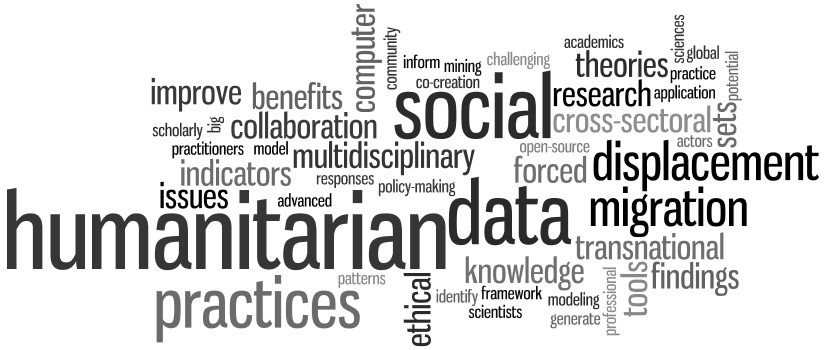The overall goal of this project is to build a community of social and computer scientists working with humanitarian actors and guided by ethical practices to explore the potential of open-source data in identifying indicators and patterns of migration in order to improve humanitarian responses to forced displacement and advance theories of migration and displacement. The partnership emphasizes the co-creation of knowledge by academics and practitioners to inform and improve humanitarian practices and policy-making. The project relies on multidisciplinary, cross-sectoral, transnational collaboration to refine the tools, assess the findings, and advise on the application of the findings to the field of humanitarian practice. As such, team members anticipate that the research will produce scholarly and social benefits relevant to a broad range of audiences.
In terms of scholarly benefits, the project will provide a model of multidisciplinary, cross-sectoral, and transnational research collaboration that can inform efforts to address other challenging global social issues. It will generate knowledge within and across computer and social sciences that advances our understanding of how to identify indicators of displacement using big data and apply the findings to strengthening humanitarian responses. We expect to have improved modeling and data mining tools to analyse large data sets and advanced theories of forced migration that can inform our understanding of how and why people move in the face of threatening contexts. We plan to develop a framework for ethical research practices in the application of large data sets to humanitarian issues. Finally, the project will contribute to student training and skill development as graduate students will gain exposure to and training in collaborative, multidisciplinary, applied research; be engaged in discussions of ethics and knowledge mobilization; and, have opportunities for co-authorship with leading researchers on the multiple computer and social science articles that are anticipated.
In terms of social benefits, the project will enhance professional humanitarian practices of states and organizations in responding to forced displacement. Practitioners from humanitarian organizations are full partners in the project and we anticipate that policymakers from Canadian government departments and international organizations will benefit from the research as well. The intent is to improve the ability of humanitarian actors to anticipate the forced displacement of large populations and hopefully prevent it or at least respond quickly to ameliorate the conditions of those displaced through the effective positioning of needed resources. The ultimate outcome is intended to be the reduction of the number of people displaced and the improved well-being of those who are.
Finally, the audiences for the research include: national and international non-governmental organizations and government departments (in Canada the Department of Foreign Affairs, Trade and Development and the Ministry of Citizenship and Immigration) engaged in humanitarian planning and responses; the academic sector (including scholarly associations such as the International Association for the Study of Migration, the Refugee Research Network, and the IEEE Computer Society); international audiences (including the UN High Commission for Refugees, the UN Office for the Coordination of Humanitarian Affairs, and the International Organization for Migration); and, students (both those directly engaged in the project and those who will benefit from the research through courses taught by project participants).
